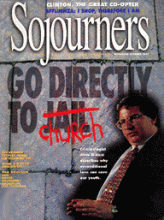Liturgical seasons bring my life order: In them, as well as the growing seasons of Minnesota, I re-enact the drama of life and death. And good drama, like good theology, implies the existential question. At its best each—theater and theology—portrays the struggle for ultimate meaning.
A brilliant example of a play as context for existential questioning is the acclaimed Broadway musical Rent. A beautiful and tragic tale of the community that develops against all odds within a rugged urban neighborhood, Rent uplifts the audience with a sense of hope in the face of hopelessness, of death’s sting displaced by love’s embrace.
Rent tells the story of a year in the life of a circle of people who are tied together by relationships with current or former roommates in a dilapidating apartment building. The cast of characters, which reminds me of the residents of a Catholic Worker house, shares with us "525,600 minutes" (the refrain of "Seasons of Love," the most well-known of the show’s tunes) of their lives.
Mark is a filmmaker whose girlfriend, performance artist Maureen, recently dumped him for Joanne. Roger, whose girlfriend had slit her wrists when she found out that they both were HIV positive, has since been a hermit trying to write his own guitar anthem. Tom Collins is a computer wizard who slags MIT’s computer lab by inserting on all computer screens the message, "Actual Reality—Act Up! Fight AIDS!" Benny married up, left the apartment, bought the building, planned to have it rehabbed...and wants to collect back rent from his tenant-friends.
Angel is a drag queen who offers assistance to Tom Collins after he is mugged in front of the building on Christmas Eve. Mimi, a dancer and a junkie, lives in an apartment in the building and brings Roger out of his depression. Various other street people from the tent city next door make up the chorus.
Read the Full Article
